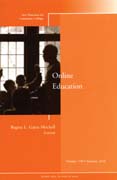
This volume highlights existing issues in online courses and programs and provides strategies for addressing them as the demand for online education continues to grow. Organizational changes caused by greater reliance on technology for teaching and learning are still not fully understood, and many colleges continue to react to change rather than positioning themselves to take advantage of it. As a challenge to that, contributors to this volume use personal narratives and research to discuss how online education continues to lead to organizational, professional, and personal change. Community colleges are at the forefront of the tremendous growth in online programs. Two-year colleges now servemore than half of all online students, and they are poised for continued growth as more adults seek education and retraining. Despite the acceptance, and even expectation, of online services and programs in education, colleges must address existing issues before expanding these. This volume is an indispensableresource in that process. This is the 150th volume of the Jossey-Bass higher education quarterly report series New Directions for Community Colleges. Essential to the professional libraries of presidents, vice presidents, deans, and other leaders in today's open-door institutions, New Directions for Community Colleges provides expert guidance in meeting the challenges of their distinctive and expanding educational mission INDICE: EDITOR'S NOTES (Regina L. Garza Mitchell). 1. Online Education in Community Colleges (Brent Cejda) The author discusses existing issues in online education at community colleges. 2. Planning for Online Courses at Rural Community Colleges (Jay Leist, Jon Travis) This chapter examines the value of online instruction and the importance of planning for online education at rural community colleges. 3. Administrative Challenges and Rewards of Online Learningin a Rural Community College: Refl ections of a Distance Education Administrator (Gwladys A. Austin) The vice president of a growing midsized community college describes the changes experienced while growing an online education program. 4. The Trials and Accomplishments of an Online Adjunct Faculty Member (Jeffrey Hoyle) An online adjunct faculty member describes his journey to success in the online environment. 5. Essential Tasks and Skills for Online Community College Faculty (Vernon C. Smith) This chapter explores the skill sets necessary for online faculty and the transformation of the faculty role. 6. Web 2.0 and Emerging Technologies in Online Learning (Veronica Diaz) This chapter addresses opportunities and challenges that colleges face as they incorporate new technologies. 7. Potential of Social Networking Sites for Distance Education Student Engagement (Jaime Lester, Michael Perini) This chapter explores the potential of social networking sites for increasing student engagement. 8. Online Student Services at the Community College (Anne M. Hornak, Kayeri Akweks, Madeline Jeffs) This chapter explores the challenges and changes in adopting online student services. 9. Approaching Common Ground: Defi ning Quality in Online Education (Regina L. Garza Mitchell) This chapter discusses the notion of quality in online education and offers recommendations for defi ning it. 10. Teaching the World to Sing: Planning for the Future of Online Learning (Albert L. Lorenzo) This chapter describes lessons learned as distance education developedand suggests elements for consideration in planning for the future. INDEX.
- ISBN: 978-0-470-88969-5
- Editorial: John Wiley & Sons
- Encuadernacion: Rústica
- Fecha Publicación: 27/09/2010
- Nº Volúmenes: 1
- Idioma: Inglés
